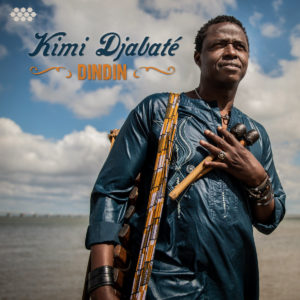Kimi Djabaté is a native of Guinea-Bissau—a small country on the west coast of Africa that until 1973 was ruled by Portugal. He is best-known as a master of the balafon that he first started playing when he was just three-years-old. His talents on the instrument, which is the African predecessor of the xylophone, is realized throughout his new release, Dindin, as well as his gifts as an acoustic guitarist, vocalist and composer.
The first cut on the album, “Afonhe” sets the stage by drawing from traditions of story-telling West African griots, who influenced Djabaté, as well as African and world beats, plus some modern touches provided by an electric guitar. It has a reggae feel though the spirit might be more accurately be described as representing the African diaspora that has musically and culturally circled the globe.
Next up is “Yensoro,” another softly-delivered upbeat, danceable tune that includes Djabaté’s balafon and an accordion. Shades of Belizean brukdown come to mind.
Djabaté‘s melodic and rhythmic approach remains uplifting throughout the album, though he is at the same time delivering strong messages on such issues as civil rights, women’s rights, children’s rights and poverty. Guinea-Bissau creole is considered by many in the country as the national language and the “language of unity.”
“Sano” is simply a lovely melodic ballad with a little lilting rhythm, offered vocally with a deep sincerity that’s apparent whether or not the language is understood. The album ends just as soulfully with Djabaté performing alone on acoustic guitar and vocals.
Dindin, which translates into children, stands as an album of continued discovery of the treasures of the African continent.




